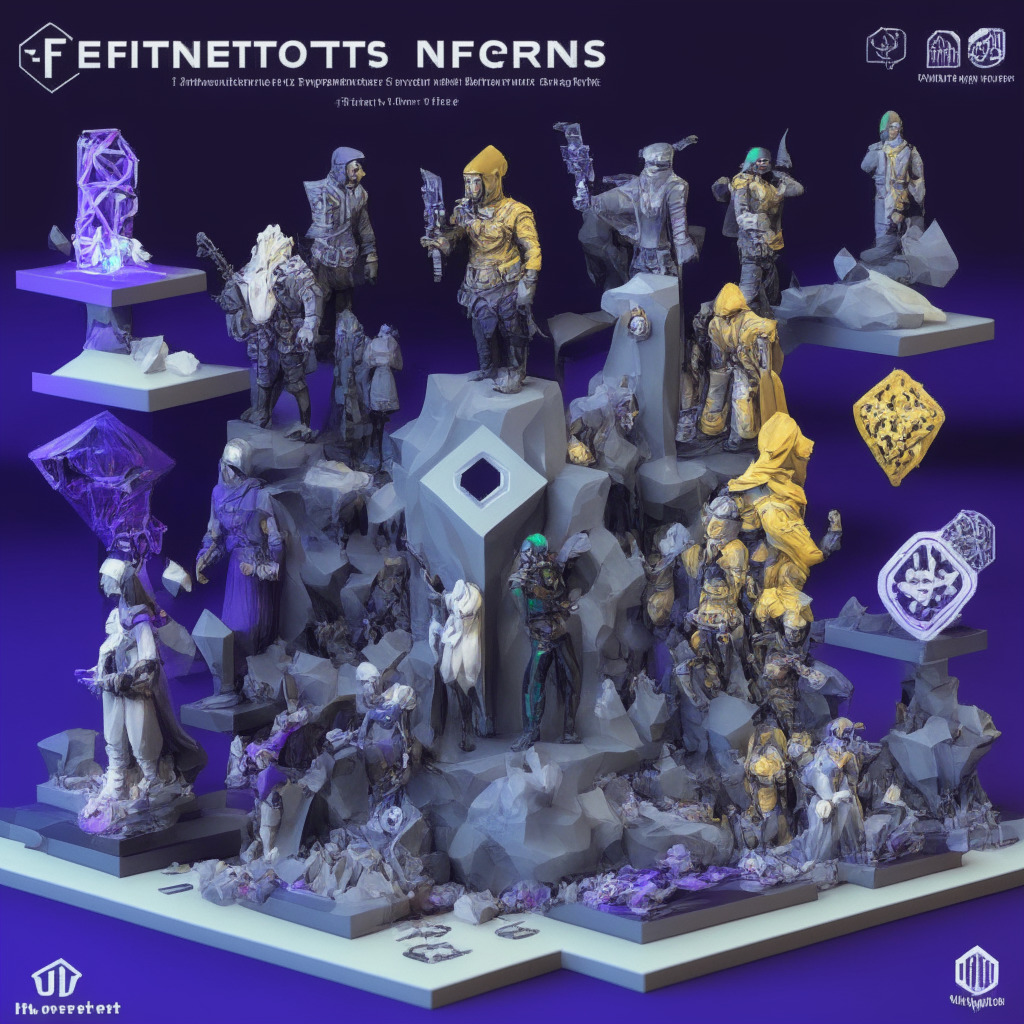“The AnubisDAO rug pull, which led to a loss of 13,556 Ether, i.e., $60 million, within 20 hours, has controversially involved Kevin Pawlak, the former head of ventures at OpenSea. While accusations link Pawlak with pseudonymous entity “0xSisyphus”, lack of concrete evidence dims their credibility. This presents pressing issues of accountability and transparency in the unregulated cryptocurrency industry.”
Search Results for: BIS
Decentralizing E-commerce: Analyzing the Revolutionary Potential of Bison Relay v0.1.8
The introduction of Bison Relay v0.1.8, a decentralized e-commerce system by Decred, is poised to transform digital retail dynamics. With features for enhanced user experience, this platform promotes increased control, improved privacy, and strengthened security in the online retail realm, potentially redefining the e-commerce landscape.
Ripple Joins BIS Task Force Amid SEC Turmoil: Revolution or Corporatization of Crypto?
Ripple announced its partnership with the Bank for International Settlements (BIS), joining the BIS’s Payment Interoperability and Extension (PIE) task force. The inclusion of Ripple aims to improve cross-border payments, aligning with the task force’s objective of enhancing payment systems globally. However, uncertainties lie in Ripple’s ongoing court dispute concerning the status of XRP as a security.
Crypto Innovations and Drawbacks: A Paradoxical View by the BIS
The Bank for International Settlements expressed skepticism about cryptocurrencies’ role in the global monetary system, citing stability, efficiency, accountability, and integrity issues. However, they acknowledged the “programmability” of money, an innovative aspect in crypto. Despite recognizing these elements, the bank believes crypto hasn’t significantly benefited society.
Musk Challenges Alleged Conflict in $258B Dogecoin Lawsuit Amid BIS CBDC Cybersecurity Efforts
“Elon Musk and Tesla face a $258 billion lawsuit over alleged misconduct related to Dogecoin cryptocurrency. Meanwhile, the Bank for International Settlements is developing a framework to protect Central Bank Digital Currencies from cyber threats, underlining the tension and commitment within the crypto and traditional financial ecosystems to the blockchain future.”
BIS Strategy for Securing Digital Currencies: A Robust Framework or a Step Towards Centralization?
The Bank for International Settlements (BIS) has released a strategy to protect central bank digital currencies (CBDCs) from cyber threats. The security framework aims to ensure confidentiality, integrity, and availability for CBDC transactions, considering potential security risks prevalent in decentralized finance (DeFi). However, the implementation of such a security model could require significant resources and may lead to debates over centralization in a decentralization-based ecosystem.
Mitsubishi UFJ’s Cross-Chain Stablecoin Platform: Potential and Challenges Ahead
Mitsubishi UFJ, in collaboration with Datachain, plans to launch a cross-chain stablecoin issuance and interoperability platform by 2024, targeting networks like Ethereum, Cosmos, Avalanche, and Polygon. The platform will enable stablecoin issuance, cross-chain swaps, lending, and payments, marking a significant milestone in connecting traditional finance with emerging blockchain technology.
Ubisoft’s Assassin’s Creed NFTs: Innovation or Over-Valuation Risk? Pros and Cons
Ubisoft collaborates with Integral Reality Labs to create Assassin’s Creed Smart Collectibles – NFT access passes on Polygon network with redeemable 3D-printed keepsakes. This partnership highlights the potential of incorporating NFTs in gaming while addressing concerns of a speculative market bubble.
A Leap or A Slip? The $1.6 Million CrypToadz NFT Purchase: A Breeding Ground for Wash Trading?
A CrypToadz NFT, normally under $1000, was bought for about $1.6 million, leading to questions about its legitimacy. The indicators point towards potential wash trading, involving a chain of transactions for liquidating dubious funds. This episode underscores the need for vigilance in the evolving cryptocurrency and NFT markets.
Understanding Blockchain Regulation Through the Lens of High-profile Crypto Cases
“This article discusses the importance of regulations in the blockchain ecosystem, using the case of Sam Bankman-Fried, facing wire fraud allegations for his investment into an AI startup, as an example. The U.S. government’s stance, allegations surrounding OpenSea and the delicate balance between beneficial and restrictive regulations are also discussed.”
Blockchain Technology’s Strength and Weakness: Navigating through Security Risks and Measures
“Despite the secure nature of blockchain technology, recent security breaches, particularly in nonfungible token platforms, have raised skepticism. While safety measures are intensifying, these incidents remind us that blockchain, while a fortress of safety, isn’t entirely immune to manipulation.”
Mandating Full Crypto Holdings Disclosure: Basel Committee’s Bold Move towards Transparency
The Basel Committee on Banking Supervision intends to mandate banks to disclose their cryptocurrency holdings fully, aiming to bolster transparency. They will detail disclosure requirements for bank’s exposure to crypto assets, with the objective to prevent potential risks within the financial ecosystem. Using this approach, the committee hopes to create increased crypto transparency.
South Korea’s Central Bank Tests Ground for Potential Wholesale CBDC Implementation: Progress or Peril?
South Korea’s central bank is collaborating with the Bank for International Settlements for a test run on wholesale central bank digital currencies (CBDCs) seeking to assess the feasibility of setting South Korea’s future monetary framework based on CBDCs. The test project focuses on the CBDC’s efficiency as a settlement asset and its programmability potential.
South Korea’s Journey to a Central Bank Digital Currency: Anticipation, Advancement and Ambiguity
The South Korean central bank, BOK, is advancing towards a Central Bank Digital Currency (CBDC) pilot, scheduled for late 2024. By testing a wholesale CBDC model first, it aims to streamline inter-bank settlements while preparing for retail use. The bank collaborates with domestic institutions and international bodies like the BIS, though it remains undecided on fully endorsing a digital won.
Exploring the Impact and Probable Consequences of Project Atlas on Crypto Tracking
“Project Atlas, launched by the Bank for International Settlements (BIS) and four European central banks, aims to revolutionize financial authorities’ management of crypto assets by tracking global asset movements. It melds data from crypto exchanges with data from public blockchains, providing tools for accurate assessment of crypto markets’ economic significance.”
Navigating the Dichotomy of Blockchain’s Future: Innovation vs Regulation
“Yield Protocol’s decision to cease operations, impacted by decreased demand and strict regulations, juxtaposes with Wirex’s launch of W-Pay, a bridge for decentralized applications and traditional payment infrastructures. The future of blockchain remains uncertain amid these contrasting developments.”
Unpacking Project Atlas: A Centralized Perspective on Decentralized Markets
‘Project Atlas’, pioneered by Bank of International Settlements and various European Central banks, is developing a proof of concept system tracking on-chain and off-chain cryptocurrency transactions. The project aims to understand macroeconomic relevance of cryptocurrency markets and decentralized finance, offering transparency and potential risk mitigation.
CBDCs: A Cornerstone for Future International Monetary System & the Tokenization of Finance
The Banque de France views central bank digital currency (CBDC) as a crucial component for the new international monetary system, enhancing cross-border payments. It’s being considered from an international perspective right from the outset. Two potential development pathways include building interoperability with legacy systems and creating regional or international platforms for CBDCs.
Ripple’s Rise in Singapore vs. Coinbase’s Legal Quagmire: Paving the Path for Crypto Regulation
The Monetary Authority of Singapore has awarded Ripple a digital payment tokens license, enhancing its position in the digital asset market. Concurrently, the SEC and Coinbase are engaged in a contentious lawsuit, calling attention to potential hurdles and the urgent need for clear cryptocurrency regulation.
Exploring Georgia’s CBDC Initiative: Promises, Concerns and the Future of Digital Currency
The National Bank of Georgia (NBG) is intensifying its efforts on a digital lari central bank digital currency (CBDC) and conducting a live pilot project involving nine firms including Ripple Labs. The envisioned CBDC design includes features like programmable money, asset tokenization, agricultural insurance provision, and real estate transaction automation. Despite potential concerns around monetary freedom, the project symbolizes the promising future of blockchain technology.
Cross-Border CBDCs: A Look at Recent Trials and Cryptocurrency Platform Bankruptcies
“France, Singapore, and Switzerland recently experimented with cross-border Central Bank Digital Currencies (CBDCs) using public blockchain and DeFi technology in a venture named Project Mariana. Despite successful trials, further investigation and iterations are required to fully understand the complexities of implementing such systems.”
Cross-Border Crypto Trading Evolution: Success of Project Mariana and What it Means for wCBDCs
“Project Mariana, a collaboration between the Bank for International Settlements and the central banks of France, Singapore, and Switzerland, has successfully tested a system leveraging cryptocurrency concepts and DeFi technology for seamless cross-border trading in wholesale Central Bank Digital Currencies (wCBDCs).”
Decoding CBDCs: User Privacy, Monetary Freedom, and the Legal Framework
“The future of CBDCs will be influenced by user privacy and monetary freedom of choice, according to Agustín Carstens of the BIS. Legal frameworks protecting user privacy are crucial for their mass adoption. The legitimacy of a CBDC comes from the central bank’s legal authority to issue it, hence legislation is imperative.”
Pushing Boundaries: Binance’s Plan for Stablecoins Expansion in Japan
“Binance plans to launch stablecoins pegged to the dollar, euro, and yen in partnership with Mitsubishi UFJ Financial Group in Japan. Leveraging MUFG’s blockchain platform, this initiative aims to launch in 2022, expanding existing crypto trading and payment services. Future offerings could also be introduced subject to regulatory approvals.”
Stablecoin Surge: Binance and MUTB’s Bold Move into Japan’s Potential $34 Billion Market
Cryptocurrency exchange Binance and Mitsubishi UFJ Trust and Banking Corporation are planning to issue Yen and foreign currency-denominated stablecoins in Japan, aligning with the country’s Payments Services Act. This venture aims to boost the adoption of Web3 in Japan, despite possible regulatory challenges. They plan to use the “Progmat Coin” platform, which prioritizes regulatory compliance in the issuance and management of stablecoins.
Huobi’s $7.9M Heist: A Tenuous Deal and the Shadow of Lazarus Group
Global cryptocurrency exchange Huobi recently experienced a cyberattack, resulting in the theft of approximately $7.9 million worth of ETH. Huobi identified the culprits and offered them a 5% reward on the returned funds, even proposing a role for the hacker as a security consultant. However, failure to comply will lead to legal action.
Balancing Acts: mBridge’s CBDC Project, Opportunities and Geopolitical Concerns
The mBridge Central Bank Digital Currency (CBDC) project, comprising members from China, Hong Kong, Thailand, UAE, and BISIH, is preparing for expansion. The project offers faster, cost-effective, and transparent cross-border transactions. Concerns rise from potential exploitation for sanctions evasion.
Swift’s CBDC Connector: Revolutionizing Digital Currency Interaction and Challenging Traditional Norms
Swift, the global financial messaging network, has partnered with three central banks to beta test a cross-border transaction solution for CBDCs. The focus is on interoperability between different digital currencies and current fiat-based systems. Swift’s CBDC innovations are designed to prevent digital islands and establish safe links between existing and future payment systems.
Navigating Blockchain Waves: Sony Leads the March of Japanese Firms into Web3 Future
“Japanese electronics titan, Sony, is reportedly focusing on developing a blockchain network in collaboration with Singapore-based Startale Labs. Sony’s IT subsidiary will pivot from IoT to the blockchain sector, aiming to propel Sony’s blockchain technology beyond established giants. This initiative could potentially create a global infrastructure powerhouse for the Web3 era.”
Regulatory Maze: Stoner Cats NFT Scandal and the Lessons for the Crypto World
Stoner Cats 2 LLC (SC2), the creators of the animated series Stoner Cats, has faced charges from the U.S Securities and Exchange Commission for conducting an unregistered offering of crypto asset securities as nonfungible tokens (NFTs). The case underlines the importance of operating within legal regulations, even in the rapidly evolving world of blockchain and cryptocurrencies.
Feasibility of Central Bank Digital Currencies: Breaking Down the Findings of Project Sela
“Project Sela, a joint initiative led by BIS, and the central banks of Hong Kong and Israel, points to the feasibility of CBDCs settling on centralized ledgers while ensuring privacy. Addressing cost factors and potential risks, it put forth an efficient solution, ‘Access Enabler,’ that allows network settlement without merchants retaining users’ CBDC. This opens a promising pathway for digital currencies to potentially become a universally accepted retail payment form.”
Navigating the Future of Finance: Analyzing Project Sela’s Digital Currency Triumphs and Trials
“Israel and Hong Kong have completed their retail central bank digital currency (rCBDC) test runs, focusing on private participation, inclusivity, and security. Project Sela merges cash characteristics with digitization benefits, addressing policy, security, technology, and legal issues. However, real-time gross settlement (RTGS) system limitations and developmental challenges remain.”






























